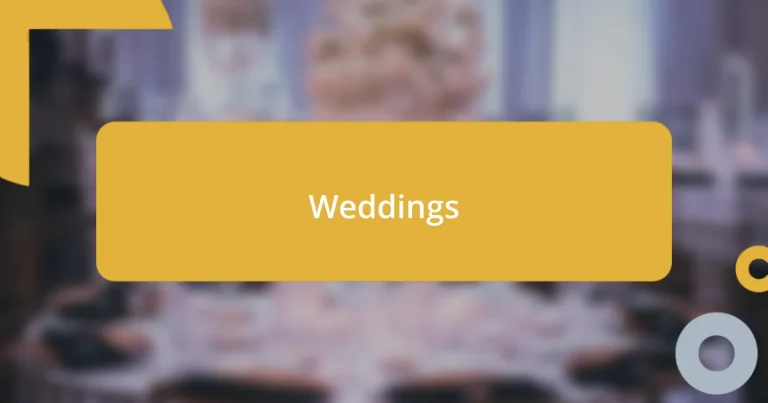Key takeaways:
- Mistakes serve as valuable learning experiences, fostering personal growth and deeper connections with others.
- Reflecting on errors enhances self-improvement, emphasizing the importance of clear communication and deep listening.
- Sharing mistakes encourages a supportive community, transforming individual challenges into collective learning opportunities.
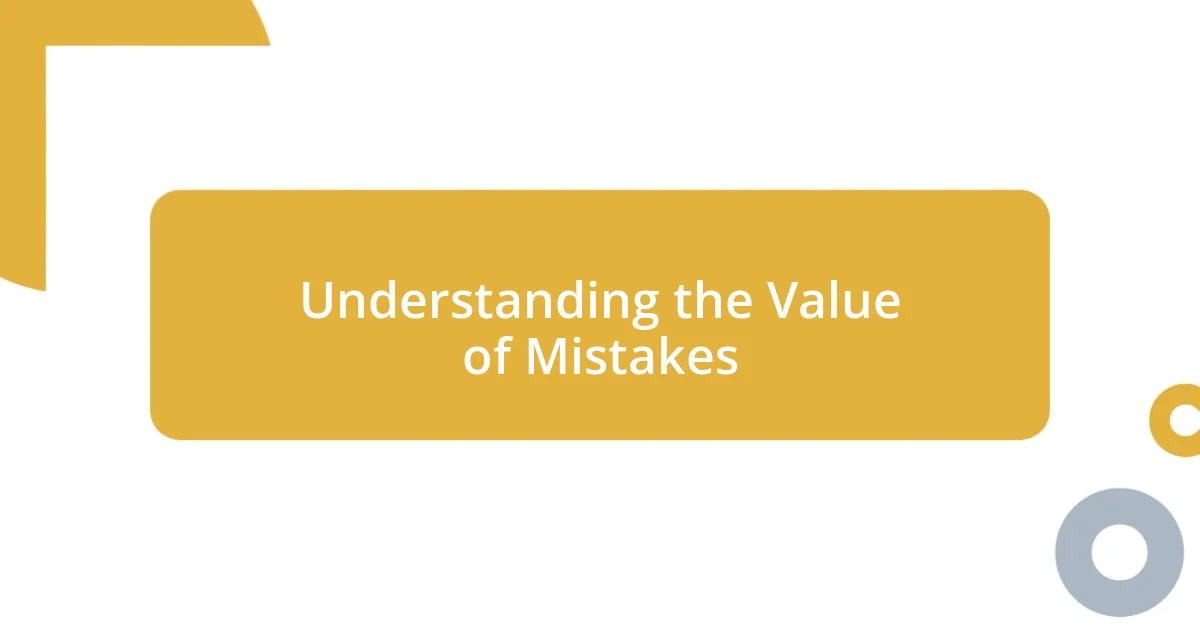
Understanding the Value of Mistakes
Mistakes often feel like setbacks, but in my experience, they open the door to growth and deeper understanding. I remember a time early in my career when I mishandled a project deadline. Instead of spiraling into panic, I chose to analyze what went wrong. That reflection not only helped me avoid similar pitfalls in the future but also made me realize the importance of planning and communication.
Have you ever tripped over your own feet while trying to impress someone? I sure have! That embarrassing moment on stage taught me that vulnerability can actually build connections. People relate to our imperfections more than we realize, fostering a sense of camaraderie. Mistakes invite others into our stories, and it’s through these shared experiences that we learn empathy and resilience.
When we embrace our errors, we begin to see them as essential parts of our journey rather than mere failures. For instance, after receiving constructive feedback on a presentation, I felt initially defeated. Yet, it was this criticism that pushed me to refine my skills and ultimately become more confident in public speaking. Isn’t it fascinating how what initially stings can transform into a stepping stone towards success?
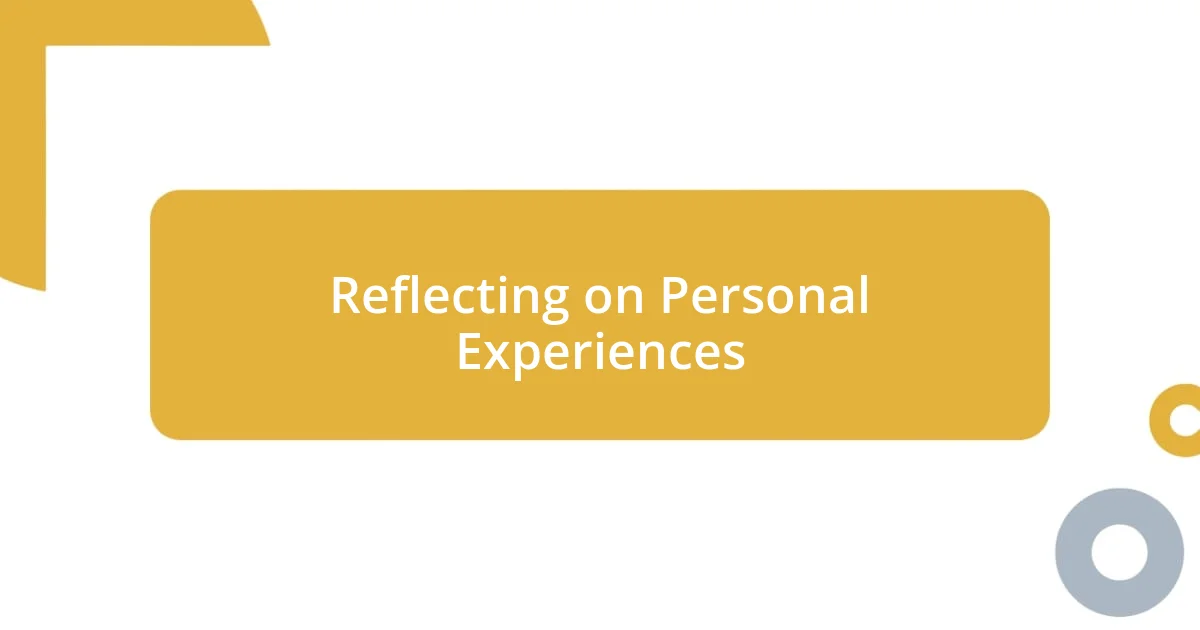
Reflecting on Personal Experiences
Reflecting on personal experiences can sometimes be uncomfortable, but I’ve found it to be incredibly enlightening. For example, I vividly recall a time when I confidently pitched an idea to my team, only to have it met with silence and disbelief. Instead of being disheartened, I took a step back to understand the reasons behind their reactions. I realized that my passion was overshadowing clarity, prompting me to focus on conveying my ideas more effectively in future discussions.
Thinking about the times I’ve misjudged situations reminds me of a significant turning point in my life. I once tried to solve a friend’s problem without fully understanding the context, which led to unintended consequences. At first, I felt a wave of guilt wash over me, but upon reflection, I realized it was a powerful lesson. Listening deeply before jumping in can create trust and strengthen relationships, a takeaway that still shapes how I interact with others today.
Every mistake I encounter teaches me something new—like the time I forgot an important client’s birthday. Initially, I felt embarrassed and unprofessional, but this prompted me to establish a system to keep track of personal details for my clients. This experience has transformed how I approach relationship-building, reminding me that attention to small details can have a major impact.
| Experience | Lesson Learned |
|---|---|
| Pitched an idea | Importance of clarity over passion |
| Misjudged a friend’s situation | Value of deep listening |
| Forgot client’s birthday | Paying attention to details |
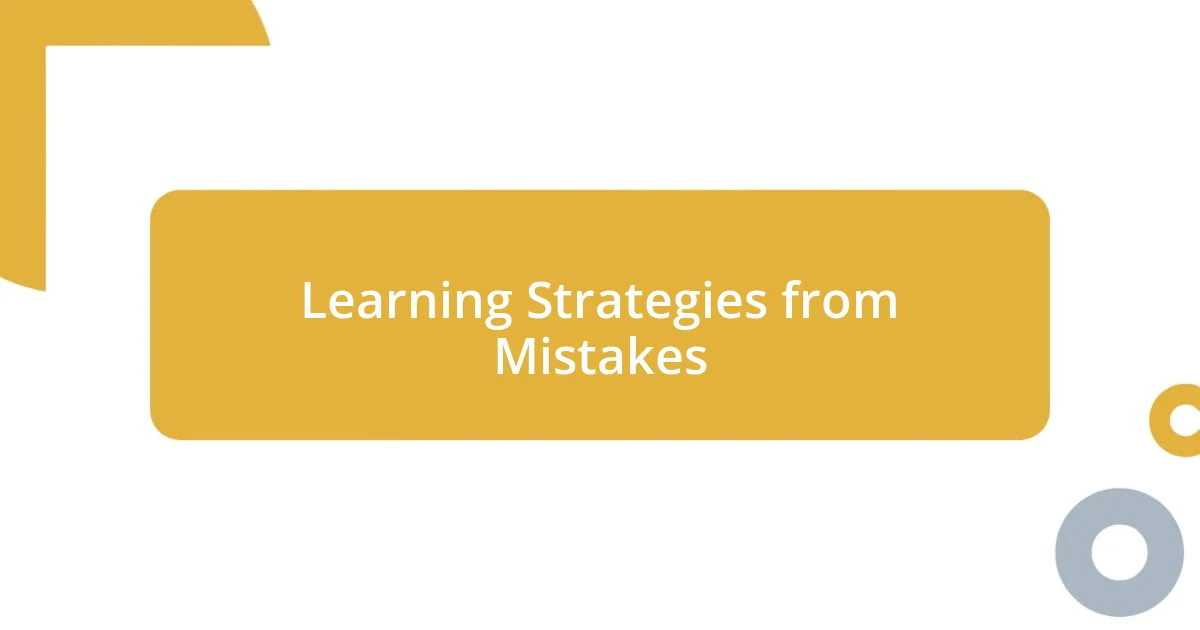
Learning Strategies from Mistakes
Learning from mistakes isn’t just about identifying what went wrong; it’s about cultivating a mindset that embraces iteration and improvement. I recall one instance where I overlooked a crucial detail in a report, leading to a miscommunication with a colleague. Instead of blaming myself, I took a step back and asked for feedback on how I could clarify my work. That simple shift taught me the importance of seeking input early on—turning potential setbacks into opportunities for collaboration.
Here are a few strategies that have helped me leverage my mistakes into learning experiences:
- Embrace Vulnerability: Share your missteps with others. This not only encourages openness but often sparks fruitful discussions.
- Seek Feedback: Actively request input from peers right after a mistake occurs. It can provide clarity and guide your next steps.
- Document Lessons: Keep a journal of mistakes and the lessons learned from each one. Referring back can serve as a valuable resource for personal growth.
- Practice Mindfulness: Like I did after my miscommunication, take a moment to breathe and reflect before reacting emotionally to a mistake.
- Celebrate Progress: Acknowledge how far you’ve come, even if it’s just from avoiding the same error twice. This fosters motivation moving forward.
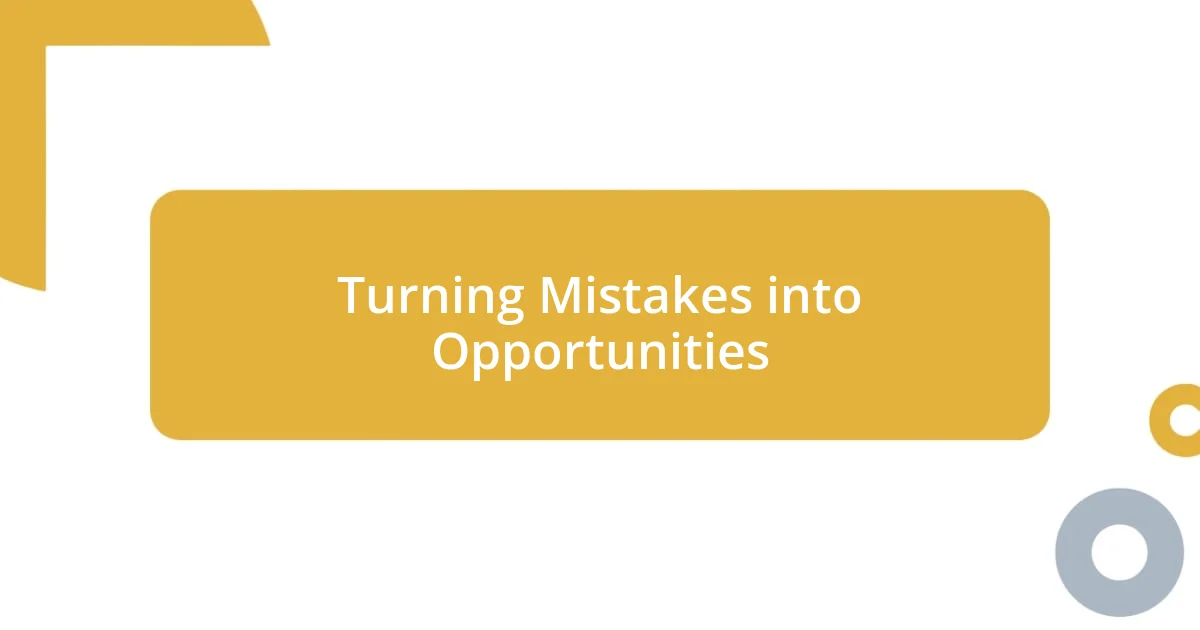
Turning Mistakes into Opportunities
It’s fascinating how mistakes can be reframed as stepping stones rather than roadblocks. I remember a time when I missed an important deadline, and my initial instinct was to spiral into self-doubt. However, I took a moment to analyze what happened and decided to view this setback as an opportunity to improve my time management skills. This mindset shift not only helped me become more organized but also made me share my experience with my colleagues, prompting a discussion about how we all could enhance our workflow.
Another instance that stands out in my memory involved a product launch that flopped. I felt crushed at first, but I soon realized that the market feedback we collected provided invaluable insights. I learned that each piece of criticism offered a lesson about customer preferences and expectations, turning what could have been a devastating loss into a roadmap for future success. How often do we overlook valuable feedback in our rush to prove ourselves?
Mistakes can feel isolating, but I’ve found that sharing them can create a sense of community. At a recent team meeting, I bravely shared my blunders during a project, expecting judgment but receiving support instead. This openness sparked conversations about our collective struggles and ultimately strengthened our bond. Isn’t it empowering to know that our vulnerabilities can bring us closer together rather than set us apart?
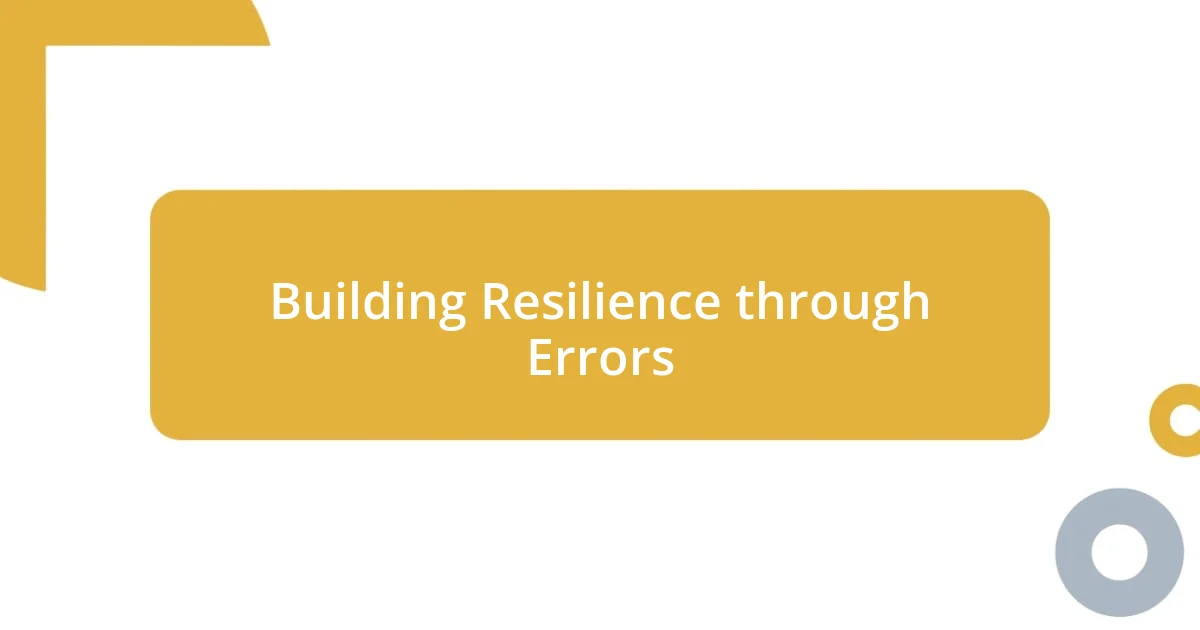
Building Resilience through Errors
Building resilience through errors is an enlightening journey. I remember a time when I mishandled a critical client presentation. The anxiety I felt was palpable, but instead of sinking into that fear, I took the plunge and asked the client how I could improve. Their feedback was not only constructive but also kind, allowing me to embrace my imperfections and ultimately enhancing my confidence. Isn’t it amazing how discomfort can lead to growth?
On another occasion, I made a major decision without fully weighing the consequences. Initially, I was paralyzed by regret, but I forced myself to reflect on what I learned about decision-making under pressure. I realized that embracing emotional intelligence—being aware of my feelings and the impact of my actions—could be transformative. This insight led me to methodically analyze future decisions, turning my mistakes into powerful learning moments rather than burdens to bear. Have you ever noticed how self-reflection can shift our perspective?
I can’t stress enough how powerful it is to connect with others about our errors. During a workshop, I decided to share my story of a failed project, anticipating an avalanche of critique. Instead, I was met with understanding and shared experiences from others. This not only helped me realize that everyone stumbles but also fostered a supportive atmosphere where we could learn from each other’s challenges. It made me wonder—what lessons might we be overlooking by keeping our struggles to ourselves?
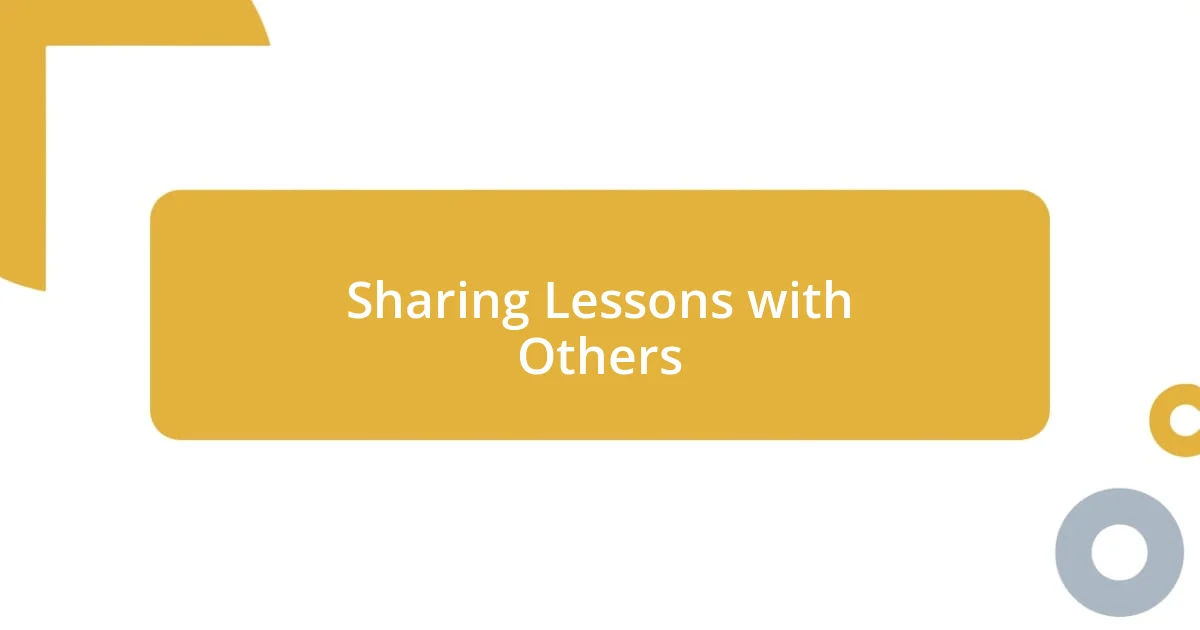
Sharing Lessons with Others
There’s something incredibly liberating about sharing my mistakes with others. I recall a day when I embarrassed myself during a team brainstorming session, completely missing the mark on a pivotal idea. Instead of shying away from that moment, I shared my misstep with my colleagues afterward. To my surprise, they opened up about their blunders too! It created a feeling of camaraderie, reminding us all that no one is infallible, and we’re in this journey together. Isn’t it refreshing to think we all have those moments?
When I consider the discussions that arise from sharing our errors, it’s like peeling back the layers of an onion. Each layer reveals a new learning opportunity. For instance, during a professional development seminar, I candidly shared my darkest moment—a project that completely went off the rails. The room came alive with story after story, echoing similar trials. It dawned on me how sharing not only lightens our emotional load but also enriches our collective wisdom. Have you ever felt the tides turning as you revealed a mistake, only to be met with patience and insight?
I find it inspiring to watch how these shared experiences can empower others. Recently, a friend confided in me about her struggles with a failed pitch. I opened up about my own pitching disasters, and suddenly, we were brainstorming ways to tackle our fears together. It was remarkable how vulnerability sparked creativity and motivation. How many opportunities to connect and grow do we miss when we keep our struggles to ourselves? Embracing openness doesn’t just foster growth; it builds lasting relationships grounded in trust and understanding.












